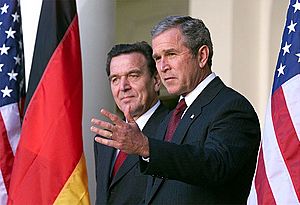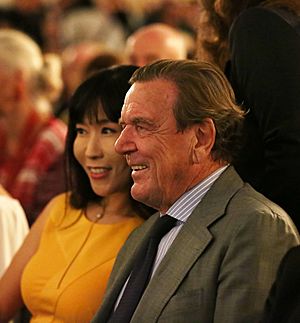Gerhard Schröder facts for kids
Quick facts for kids
Gerhard Schröder
|
|||||||||||||||||||||||||||||||||||||||
|---|---|---|---|---|---|---|---|---|---|---|---|---|---|---|---|---|---|---|---|---|---|---|---|---|---|---|---|---|---|---|---|---|---|---|---|---|---|---|---|
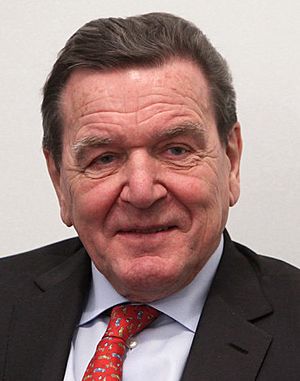
Schröder in 2016
|
|||||||||||||||||||||||||||||||||||||||
| Chancellor of Germany | |||||||||||||||||||||||||||||||||||||||
| In office 27 October 1998 – 22 November 2005 |
|||||||||||||||||||||||||||||||||||||||
| President | Roman Herzog Johannes Rau Horst Köhler |
||||||||||||||||||||||||||||||||||||||
| Vice Chancellor | Joschka Fischer | ||||||||||||||||||||||||||||||||||||||
| Preceded by | Helmut Kohl | ||||||||||||||||||||||||||||||||||||||
| Succeeded by | Angela Merkel | ||||||||||||||||||||||||||||||||||||||
| Leader of the Social Democratic Party of Germany | |||||||||||||||||||||||||||||||||||||||
| In office 12 March 1999 – 21 March 2004 |
|||||||||||||||||||||||||||||||||||||||
| General Secretary | Franz Müntefering Olaf Scholz |
||||||||||||||||||||||||||||||||||||||
| Preceded by | Oskar Lafontaine | ||||||||||||||||||||||||||||||||||||||
| Succeeded by | Franz Müntefering | ||||||||||||||||||||||||||||||||||||||
| Minister-President of Lower Saxony | |||||||||||||||||||||||||||||||||||||||
| In office 21 June 1990 – 27 October 1998 |
|||||||||||||||||||||||||||||||||||||||
| Deputy | Gerhard Glogowski | ||||||||||||||||||||||||||||||||||||||
| Preceded by | Ernst Albrecht | ||||||||||||||||||||||||||||||||||||||
| Succeeded by | Gerhard Glogowski | ||||||||||||||||||||||||||||||||||||||
| President of the German Bundesrat | |||||||||||||||||||||||||||||||||||||||
| In office 1 November 1997 – 27 October 1998 |
|||||||||||||||||||||||||||||||||||||||
| First Vice President | Erwin Teufel | ||||||||||||||||||||||||||||||||||||||
| Preceded by | Erwin Teufel | ||||||||||||||||||||||||||||||||||||||
| Succeeded by | Hans Eichel | ||||||||||||||||||||||||||||||||||||||
| Leader of the Opposition in the Landtag of Lower Saxony |
|||||||||||||||||||||||||||||||||||||||
| In office 9 July 1986 – 21 June 1990 |
|||||||||||||||||||||||||||||||||||||||
| Minister-President | Ernst Albrecht | ||||||||||||||||||||||||||||||||||||||
| Preceded by | Karl Ravens | ||||||||||||||||||||||||||||||||||||||
| Succeeded by | Jürgen Gansäuer | ||||||||||||||||||||||||||||||||||||||
|
|||||||||||||||||||||||||||||||||||||||
| Personal details | |||||||||||||||||||||||||||||||||||||||
| Born |
Gerhard Fritz Kurt Schröder
7 April 1944 Blomberg, Germany |
||||||||||||||||||||||||||||||||||||||
| Political party | Social Democratic (since 1963) |
||||||||||||||||||||||||||||||||||||||
| Spouses |
|
||||||||||||||||||||||||||||||||||||||
| Children | 2 | ||||||||||||||||||||||||||||||||||||||
| Residences | Zoo, Hanover-Mitte | ||||||||||||||||||||||||||||||||||||||
| Alma mater | University of Göttingen | ||||||||||||||||||||||||||||||||||||||
| Awards | Order of Merit | ||||||||||||||||||||||||||||||||||||||
| Signature | |||||||||||||||||||||||||||||||||||||||
Gerhard Fritz Kurt Schröder was born on April 7, 1944. He is a German former politician. He served as the Chancellor of Germany from 1998 to 2005. The Chancellor is like the head of government in Germany. From 1999 to 2004, he was also the leader of the Social Democratic Party of Germany (SPD).
As Chancellor, he led a government made up of the SPD and Alliance 90/The Greens. After leaving public office, Schröder worked for some Russian energy companies.
Before becoming Chancellor, Schröder was a lawyer. He was also the Minister President of Lower Saxony from 1990 to 1998. He took over from Helmut Kohl, who had been Chancellor for a long time. Schröder tried to help with unemployment and poverty in Germany. He introduced reforms called Agenda 2010.
In 2003, he and French President Jacques Chirac decided not to join the United States in the Iraq War. After the 2005 election, his party lost, and Angela Merkel became Chancellor. Schröder later resigned from some roles at Russian companies in 2022.
Contents
Early Life and Education
Gerhard Schröder was born in Blomberg, Germany. His father, Fritz Schröder, was a soldier who died in World War II in 1944, shortly after Gerhard was born. His mother, Erika, worked hard to support her two sons.
After the war, Schröder worked in retail shops and as a construction worker. He studied at night school to get his university entrance qualification. From 1966 to 1971, he studied law at the University of Göttingen. He became a lawyer in 1976 and worked in this field until 1990.
Early Political Career
Schröder joined the Social Democratic Party (SPD) in 1963. In 1978, he became the national leader of the Young Socialists in the SPD, which is the youth group of the SPD.
Member of the German Parliament
In 1980, Schröder was elected to the Bundestag, which is Germany's federal parliament. He was known for wearing a sweater instead of a suit, which was unusual for politicians at the time. He served in the SPD group in parliament until 1986.
In 1985, Schröder met with Erich Honecker, the leader of East Germany. In 1986, Schröder was elected to the state parliament of Lower Saxony. He became the leader of the SPD group there.
Leading Lower Saxony
In June 1990, the SPD won the state elections in Lower Saxony. Schröder became the Prime Minister of Lower Saxony. He led a government with the Green Party. He won the state elections again in 1994 and 1998.
As Prime Minister, he also joined the board of Volkswagen, a very large car company in Lower Saxony. The state of Lower Saxony owns a lot of shares in Volkswagen. From 1997 to 1998, he was also the President of the Bundesrat of Germany, which represents the German states.
Chancellor of Germany (1998–2005)
First Term (1998–2002)
After the 1998 national elections, Schröder became Chancellor. He led a government made up of the SPD and the Green Party. He promised to help the economy grow and keep Germany's social welfare system strong.
In 1999, Schröder also became the leader of the Social Democratic Party. He worked with British Prime Minister Tony Blair on ideas for economic reform in Europe. They suggested cutting taxes and making changes to labor and welfare systems.
During his time as Chancellor, the German government moved its main offices from Bonn to Berlin. Schröder moved into the new Federal Chancellery in Berlin in May 2001.
Second Term (2002–2005)
In the 2002 German election, Schröder's party was behind in the polls. However, his popularity grew after severe floods in Germany. His strong opposition to the Iraq War also helped him. He won another four-year term, but with a smaller majority.
In February 2004, Schröder resigned as chairman of the SPD. This was due to criticism within his party about his reform plans. Franz Müntefering took over as chairman.
In May 2005, after his party lost a state election, Schröder decided to call for new federal elections. His government lost a vote of confidence in parliament, which allowed new elections to be held.
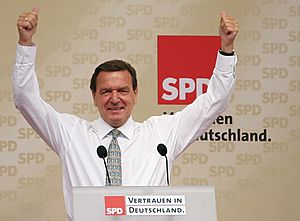
The 2005 German federal elections took place on September 18. Neither Schröder's SPD-Green group nor Angela Merkel's party had a clear majority. After talks, they agreed to form a "grand coalition." This meant the two largest parties would work together. Schröder agreed that Merkel would become Chancellor.
On November 11, 2005, Schröder announced he would not join the new government. He left politics after Merkel became Chancellor on November 22, 2005. He resigned from his seat in the Bundestag on November 23, 2005.
Domestic Policies
During his first term, Schröder's government made several important decisions. They decided to stop using nuclear power and to support renewable energy. They also allowed civil unions for same-sex partners and made it easier for people to become German citizens.
Germany's economy faced challenges during his time. Economic growth was slow, and unemployment was high. Schröder introduced the Agenda 2010 reform program. This included changes to the social welfare system, like unemployment payments and pensions. He also lowered taxes. These changes were meant to help the economy but were not always popular.
European Integration
Schröder worked closely with French President Jacques Chirac. They held regular meetings to discuss European issues. In 2003, they agreed on how the leaders of the European Union should be chosen. This agreement later became part of the Treaty of Lisbon.
Schröder also pushed for changes to the EU's budget rules. He wanted the rules to encourage economic growth more. He was a strong supporter of Poland joining the European Union in 2004. He also supported Turkey joining the EU.
Foreign Policy
Schröder changed Germany's foreign policy. He said Germany was a "great power in Europe" and would act to protect its interests. He sent German troops to Kosovo and Afghanistan as part of NATO operations. Before this, German troops had not been in combat since World War II.
Schröder also worked to help people who were forced to work in German factories during the Nazi era. He helped set up a fund to pay them back.
In 2002, Schröder said Germany would not join the Iraq War without a United Nations approval. He called this the "German Way." This caused some disagreements with the United States.
Relations with China
Schröder visited China six times as Chancellor. He was the first Western leader to apologize after NATO planes accidentally bombed the Chinese Embassy in Belgrade in 1999. He also pushed for the EU to lift its arms embargo on China.
Relations with Russia
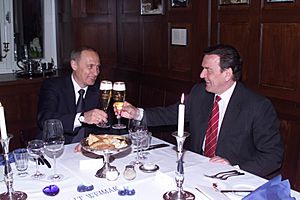
Schröder developed a close relationship with Russian President Vladimir Putin. They worked to strengthen the partnership between Germany and Russia. This included plans for a gas pipeline under the Baltic Sea, called Nord Stream 1.
Schröder was criticized for calling Putin a "flawless democrat" in 2004. In his last days as Chancellor in 2005, he signed a deal for the Nord Stream 1 pipeline. Soon after leaving office, he joined the pipeline company's board of directors. This led to questions about his actions as Chancellor.
After Chancellorship
After leaving office, Schröder took on various roles. He represented Germany at the funerals of Boris Yeltsin and Fidel Castro. He also worked as a mediator in some disputes, like one about German railway privatization.
In 2017, he helped secure the release of a German activist from a Turkish prison. He met with Turkish President Recep Tayyip Erdoğan for this purpose.
Business Activities
Schröder has held several business positions since leaving politics. He became chairman of the Shareholders' Committee for Nord Stream 1. He also served on the advisory boards of companies like N M Rothschild & Sons and China Investment Corporation. He was also chairman of the supervisory board for the football club Hannover 96.
Other Activities
Schröder has also been involved in many other organizations. He is a member of the Berggruen Institute and the board of trustees for the Bundesliga Foundation. He is also involved with the German Cancer Research Center and the Friedrich Ebert Foundation.
Personal Life
Gerhard Schröder has been married five times. His current wife is South Korean economist and interpreter Kim So-yeon, whom he married in 2018.
He and his fourth wife, Doris Köpf, adopted two children from Saint Petersburg, Russia, in 2004 and 2006.
Schröder is a Lutheran-Protestant. He is also known for collecting art. His official portrait for the German Chancellery was painted by his friend Jörg Immendorff.
In February 2025, Schröder was hospitalized due to severe burnout.
Awards and Honours
National Honours
- Germany: Grand Cross 1st Class of the Order of Merit of the Federal Republic of Germany (1999)
Foreign Honours
- Georgia: Order of the Golden Fleece (2000)
- Poland: Order of the White Eagle (2002)
- Romania: Grand Cross of the Order of the Star of Romania (2004)
- Croatia: Knight Grand Cross of the Grand Order of Queen Jelena (2007)
- Czech Republic: Order of the White Lion (2017)
Other Honours
- In 2000, Schröder received the Deutscher Medienpreis.
- In 2007, he received the Quadriga Prize.
- In 2008, he became a corresponding member of the Russian Academy of Sciences.
Honorary Degrees
Schröder has received several honorary doctorates from universities around the world:
- Tongji University in Shanghai (2002)
- St. Petersburg University (2003)
- Marmara University in Istanbul (2005)
- University of Göttingen (2005)
- University of Damascus in Syria (2007)
- University of Urbino in Italy (2007)
Rescinded Honours
Schröder was made an honorary citizen of his hometown, Hanover, in 2006. However, in March 2022, the city council started a process to take away this honor due to his connections with Russia. Schröder then chose to give up the honorary citizenship himself.
Images for kids
See also
 In Spanish: Gerhard Schröder para niños
In Spanish: Gerhard Schröder para niños
 | Lonnie Johnson |
 | Granville Woods |
 | Lewis Howard Latimer |
 | James West |


